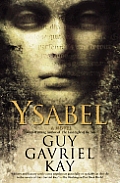This book is a departure for Kay, who after a high fantasy trilogy has been exclusively writing historical novels set in renamed and slightly rejiggered pasts and touched by the fantastic. The past still figures heavily in Ysabel, in the form of a recurrent love triangle built on echos of conflicts between Romans and Celts, but its setting is entirely modern-day. Ysabel is also a young-adult story with a fifteen-year-old protagonist and a far less complex plot than Kay's typical novel.
Ned is the son of a world-famous photographer, accompanying his father and his staff (including the hyper-efficient Melanie) on an extended photo shoot in Provence, France. His mother is in the Sudan, a volunteer with Doctors Without Borders. That's the primary worry in Ned's life until he meets a local girl in a cathedral, has a run-in with a dangerous-seeming man who comes from somewhere he shouldn't be, and then sees a sculpture about which he knows far more than he should. Predictably, Ned's mysterious powers grow stronger, the past ends up posing a direct threat to his family, and he and Kate have to find a way to resolve mysteries that are thousands of years old.
Some of the narration is told with Kay's typical gravitas and sense of mythic weight. When reading a Kay novel, one is rarely in doubt about the importance of events. Ned, however, is quite unlike a typical Kay protagonist: he approaches the world through banter, makes light of things that bother him, and spends much of the book teasing and being teased. This is clearly intended to show affection (and doesn't fail), but it also seems intended to lighten the mood and make the book more approachable for younger readers. In that role, it clashes oddly with Kay's typical narrative style. Occasionally, I wanted to strangle Ned or yell at the other characters to take things seriously, and the dramatic narration (a touchy technique in the best of circumstances) can feel overwrought in contrast. Kay's narrative style does work on its own terms and succeeds brilliantly in other books (see The Last Light of the Sun, for example), but it's difficult to recognize that from this example.
The banter is occasionally enjoyable on its own terms, although Kay's ear isn't the best and there's not quite enough sarcasm. Unfortunately, the change in tone doesn't stop with banter; Ned's father's party also has a penchant for practical jokes and stupid competitions. I'm sure this was funny to someone, but I'm not that someone. I personally detest practical jokes, so fictional treatments of them start with two strikes, and Ned's reactions are full of the standard hypocrisy. He's a bit prickly and hates being embarassed, so of course he does to other people what he claims to dislike when it's done to him. I know there's a social dynamic to this that works for others, but I still don't enjoy reading about it.
All this unfortunately leaves Ysabel feeling disappointingly shallow. Usually Kay's strength is the depth of emotion he portrays in his characters, and while there are moments here, it's a faint shadow of his other work. A faint shadow of someone as good as Kay is still an enjoyable read, and despite a straightforward plot, Kay had me hooked by the middle of the book and feeling for Ned by the end. It helps that he introduces some fantastic supporting characters: Melanie is a delight, Ned's dynamic with his father is refreshingly healthy, and while Kate is a bit of a non-entity, Kay more than makes up for her with Ned's mother and aunt. The primary mythical characters of the piece run a bit too far towards archetypes, but I suppose that's justified by the story, and they do show enough individual character to be interesting. The plot and ending are quite predictable, perhaps falling victim to the idea that young adult stories should be simple, but there's enough real emotion in the climax (and delicate handling of the denouement) to leave me satisfied.
In Kay's oeuvre, Ysabel is destined to be a minor work. I hope he goes back to writing adult fiction after this; contemporary young adult is an interesting variation, but I don't think he has the feel for it and this take lacks the depth that makes Kay's fantasy so compelling. But even in a minor work, Kay is one of the best epic fantasy writers currently publishing. Ysabel is uneven and falls short of great, but it's still worth the read. After you've read the rest of Kay's works.
Reviewed: 2007-05-24
